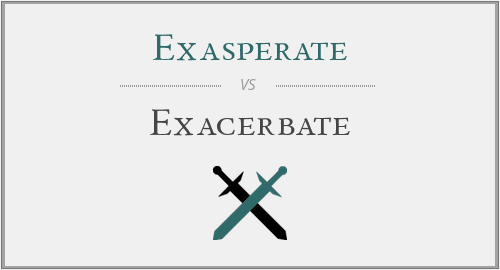
Exasperate vs Exacerbate
There can be a tendency to confuse these two words and incorrectly swap them out, as they sound similar. Read on to learn how to properly use them in speaking or writing.
Exasperate
'Exasperate' is a verb that means 'to irritate, provoke, frustrate, or annoy intensely.' Use it to describe the feeling of becoming flustered and losing patience.
examples:
Michael's constant tardiness is beginning to exasperate his therapist to no end.
No one gets more exasperated than the office manager when supplies run low and haven't been reordered.
Exacerbate
The verb 'exacerbate' means 'to make a situation even worse in some way.' Use it to illustrate that a person, behavior, or action is detrimental or causing impairment.
examples:
Alan didn't realize that eating two helpings of lasagna was going to exacerbate his fever.
The freezing rain and sleet were exacerbating the road conditions in and around town.
Conclusion
As you can see, the subtle differences can make a big difference between words that are one step more complicated than homonyms. Practice saying statements that are emblematic of the idea you want to convey. A good sentence to keep the meaning of these words in focus is:
It's exasperating to remember not to exacerbate grammar rules!








Have a discussion about this article with the community:
Report Comment
We're doing our best to make sure our content is useful, accurate and safe.
If by any chance you spot an inappropriate comment while navigating through our website please use this form to let us know, and we'll take care of it shortly.
Attachment
You need to be logged in to favorite.
Log In